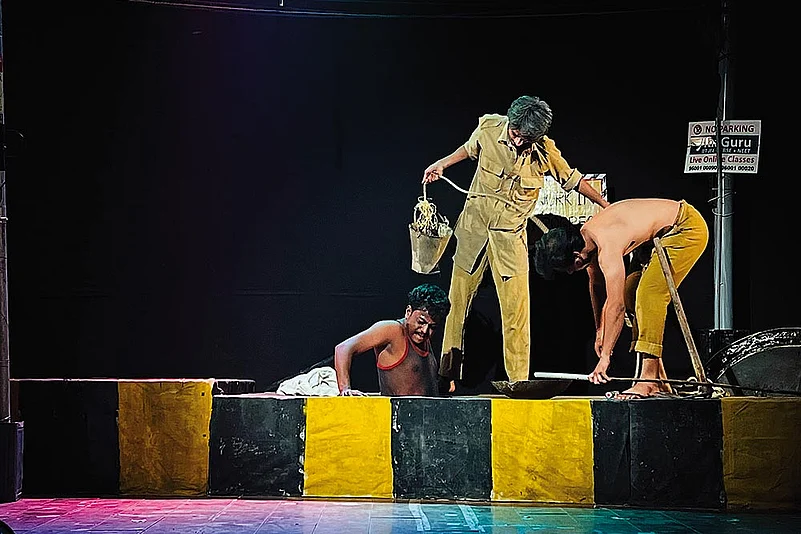“I feel we were born to do this job. There is no escape. Our Mehtar caste ensures that no other work will be offered to us. Every time I lower myself into a gutter, the stench and that liquid full of faeces enter my eyes, nostrils and my mouth. I know that I am risking my life. I have watched many of my folks faint and die due to the poisonous gases that emanate in these sewers. So, I consume a bottle of country liquor and use a bit of ganja (marijuana) to numb my senses. That is the only way I can bring myself to wade through the filth to unclog the gutters of this city.”
Acting Away Oppression: Challenging The Societal Prejudices Behind Manual Scavenging
Virendra Ganvir uses theatre as a medium to confront the societal inequalities associated with manual scavenging

—A manual scavenger
This is the only job which is caste-specific. Tell me if there is any other job which comes with a caste tag,” says Virendra Ganvir, a theatre artist in Nagpur and founder of Bahujan Rangbhoomi, a banner that presents plays based on the lives and issues of the underprivileged.
It is only those who hail from the Mehtar community, the lowest in the caste hierarchy of India, who are called upon to take up the task of manual scavenging. Though there is a ban on manual scavenging, the civic authorities and others continue to engage them for cleaning sewers. “Even if a person from the Mehtar or Valmiki caste is employed in some other work, he will be called upon to clean a clogged sewer, as his caste says that he is born to do this work,” observes Ganvir, who has researched their lives minutely and written a play, Gatar, based on the issue of manual scavenging and the suffering of those who are employed in this work.
The Employment of Manual Scavengers and Construction of Dry Latrines (Prohibition) Act was enacted by the Union government in 1993. Later, it added the rehabilitation clause and the act became the Prohibition of Employment as Manual Scavengers and their Rehabilitation Act, 2013. But these legal provisions have not been able to stop manual scavenging or the loss of lives. That’s why the Supreme Court, in several judgements over the years, has asked the government why it has not been able to implement the law in letter and spirit. As many as 339 people have died while cleaning sewers and septic tanks in India in the last six years, according to government data. Nine such deaths were recorded in 2023, 66 in 2022, 58 in 2021, 22 in 2020, 117 in 2019 and 67 deaths in 2018.

“Hiring a machine to clean the sewers may cost upwards of Rs 2,000, while a human scavenger would do the job for as little as Rs 500 or Rs 1,000,” says Ganvir. “These people have continued to do this work for want of a better job as none are given to them due to the stigma attached to their caste and also because they are so poor and this work brings in some money,” adds Ganvir.
The play ends with a distraught Ravi shutting the manhole, placing his foot on it and telling his community, “No more of this.”
“I lived near a slum settlement inhabited by the Mehtar community. Just as you can identify a defence area like a cantonment and witness its cleanliness and orderliness, similarly, you can recognise a settlement of the Valmiki community from a distance—shops selling cheap country liquor can be found in plenty around these bastis. A typical scene would be of men consuming alcohol and gambling all day long, and kids—who presumably don’t have a school to study—loitering around aimlessly. The women are mostly hired to clean toilets in residential societies or colonies,” says Ganvir, whose play speaks of the trials and travails of the community. The play, first staged in 2016, has had 86 shows and has won 90 awards across the state of Maharashtra, including the prestigious Maharashtra Rajya Natya Spardha award in 2023, where it won all eight awards in different categories.
Gatar tells the story of manual scavengers through its protagonist, Ravi, a bright boy born into a family of sewer cleaners. His grandfather and parents decide to keep him away from this and work hard to support his schooling. One day, news of three people found dead in a gutter reaches Ravi, who is now studying in a college. One of the dead is his father. He rushes to the site, where the family members are sitting around the manhole and wailing. With no help in sight, and nobody willing to pull out the bodies due to caste constraints, Ravi decides to lower himself into the gutter. The play ends with a distraught Ravi shutting the manhole, placing his foot on it and telling his community after a long monologue, “No more of this.”

Describing the play as one that challenges societal prejudices, Marathi author and poet Yashwant Manohar says: “It also attempts to explain the struggles and aspirations of those engaged in this filthy work and their quest for a better life. The play empowers theatre as it compels the audience to confront social inequalities and foster critical thinking and awakens the human consciousness.”
Gatar has attracted audiences also for the manner in which Ganvir has recreated a settlement of scavengers on stage. Over a space of no more than 6 feet x 10 feet, an impression of a sewer is created, into which the actors lower themselves during the play. “In a proscenium theatre, the audience sees people lowering themselves into a hole, but when we do this play in schools and colleges, benches are used to create a pit. At every show, once the play gets over, the judges and special invitees crowd the stage just to understand how three actors can lower themselves in this small space and get covered in muck as they are pulled out,” says Ganvir.
The play, which has been staged in Marathi and Hindi, remains very close to the writer/director’s heart. “I wrote it to generate awareness about the plight of these people as well as also to awaken them about their rights and possibilities for a better life,” says Ganvir, who has held shows at the Shri Ram Centre for Performing Arts, and the National School of Drama, New Delhi, where many amateur actors groomed by him are studying. “The perpetuation of caste-based discrimination and the social stigma contributes towards the continuation of manual scavenging. Alternative livelihood opportunities are not easy to come by, trapping this community in a never-ending cycle of poverty and exclusion,” says Ganvir, who himself suffers from typecasting. As Ganvir too belongs to the Scheduled Caste category, people have branded his work as ‘Dalit theatre’, he says, objecting to this tag. “Though artists from all castes and communities work in my theatre group, the perception is that I am only writing about subjects that concern Scheduled Castes and Scheduled Tribes. This is not true at all,” says the playwright, who has done many plays based on narratives that lean towards the Left or deal with fascist forces.
Lamenting the absence of an inclusive society, Ganvir says that people of the Valmiki caste remain uneducated as society does not provide them an environment to improve through education. “They suffer from low self-esteem as they are engaged in this humiliating work of handling human waste with bare hands. So they have to get themselves in a drunken stupor to do their work and suffer from depression and long-term psychological trauma.”
Such is the apathy and exploitation around this community that Ganvir says even the actors who play the parts of scavengers are derided and ridiculed by their peers. “Though many big names of Marathi cinema and theatre have watched my play—either as judges or as part of the audience—and have showered praise, I have not been able to bring even a single municipal official into the auditorium.” As the play progresses towards its 100th show, Ganvir hopes to get someone from the government to watch it.
This first appeared in the print as 'Acting Away Oppression'
(Views expressed are personal)
- Previous Story
 Joker: Folie à Deux Review: Joaquin Phoenix and Lady Gaga Can’t Rescue a Flubbed-Experiment Sequel
Joker: Folie à Deux Review: Joaquin Phoenix and Lady Gaga Can’t Rescue a Flubbed-Experiment Sequel - Next Story
























